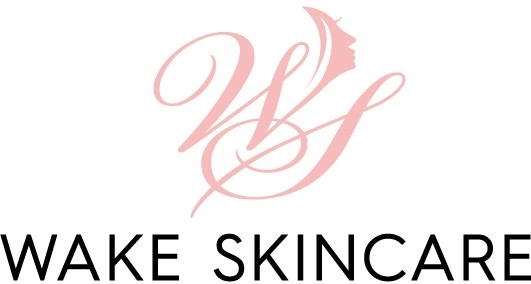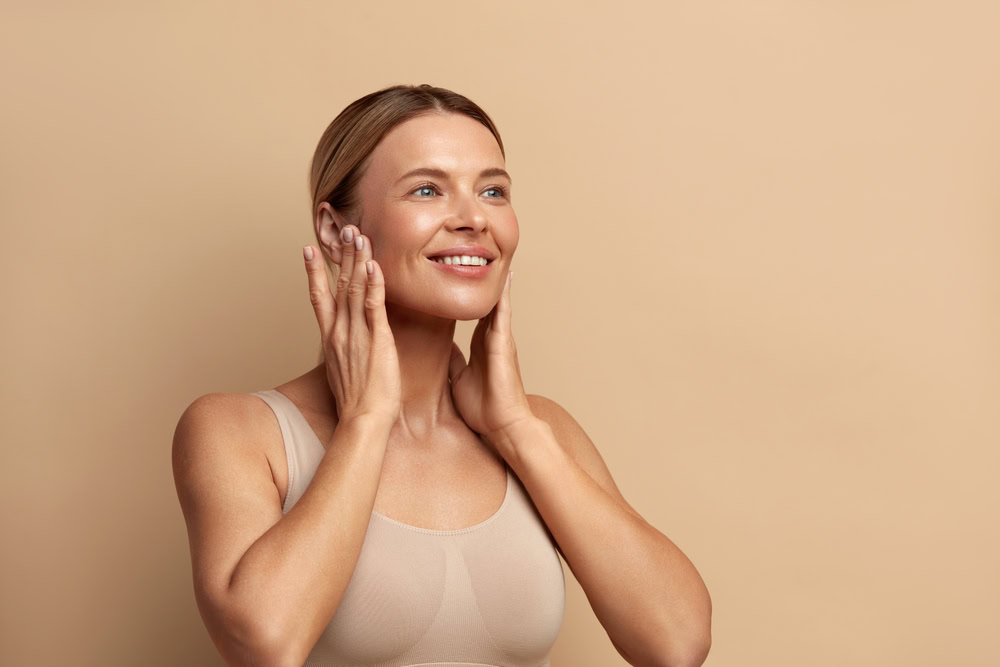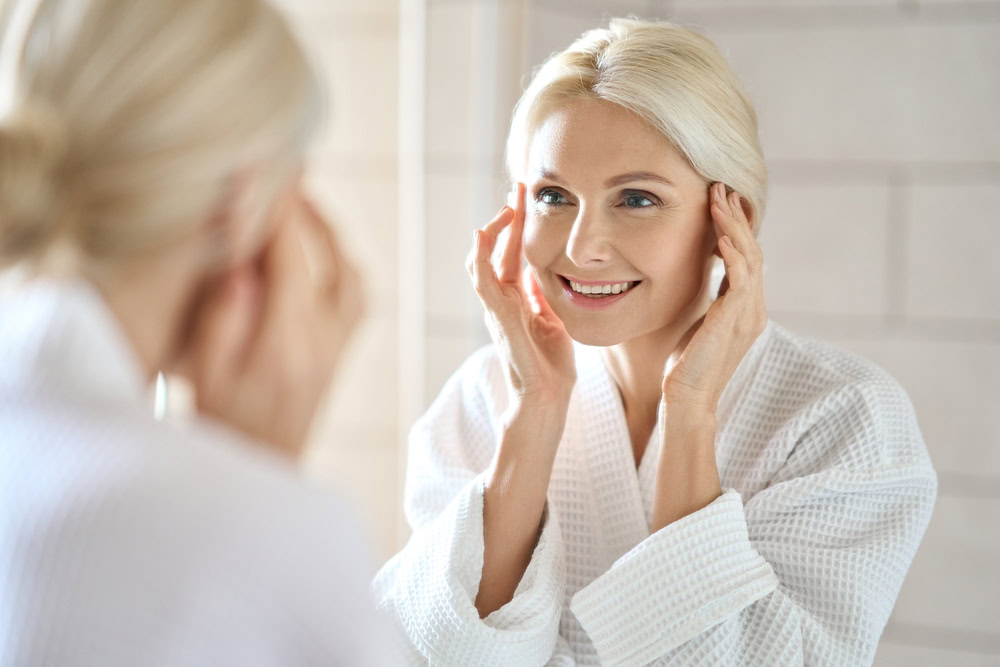Summary:
How Antioxidants Protect Your Skin from Daily Damage
Antioxidants fight harmful free radicals that come from external sources like air pollution or internal processes like metabolism, and applying topical antioxidants can combat free radicals to improve skin’s overall appearance. Think of free radicals as unstable molecules that steal electrons from healthy skin cells, causing a domino effect of damage.
Antioxidants protect healthy skin cells by “giving” these free radicals an electron, rendering them harmless. This process stops the chain reaction of cellular damage that leads to visible signs of aging. Your skin has a sophisticated antioxidant defense system, but topical antioxidants provide additional protection from both internal cellular metabolism and external UV exposure.
The result is skin that maintains its structural integrity, stays firmer longer, and shows fewer signs of environmental stress over time.
Why Your Natural Antioxidant Defense Needs Help
Your skin cells continuously produce free radicals through cellular respiration and metabolic processes, which are normally neutralized by enzymatic and non-enzymatic systems in a physiological balance, but when this balance breaks, cellular structures may suffer modifications that trigger skin diseases. This natural defense system becomes overwhelmed as you age and face increased environmental stressors.
More than four in 10 people in the United States live in areas with unhealthy levels of ozone pollution, affecting 134 million individuals, and ground-level ozone contributes to free-radical formation that creates oxidative stress. Your skin’s antioxidant reserves get depleted faster than they can be replenished naturally.
Environmental exposure to pollution, tobacco, and alcohol increases oxidative stress and aging, but antioxidants from healthy diet and skincare products can help prevent this damage. Urban living in Wake County means your skin faces daily challenges from traffic pollution, industrial emissions, and UV radiation that overwhelm your natural defenses.
Oxidative stress weakens skin’s collagen and elastin, increasing fine lines and loss of firmness, but vitamin C as a proven antioxidant helps neutralize free radicals in skin. Without supplemental antioxidant protection, these environmental factors accelerate visible aging and compromise your skin’s ability to repair itself effectively.
The Science Behind Free Radical Damage and Aging
Free radicals disrupt defense and restoration mechanisms, significantly contributing to skin damage and accelerated aging, while natural compounds in plants exhibit antioxidant properties and the ability to scavenge free radicals. The damage occurs at the molecular level, affecting your skin’s DNA, proteins, and lipid membranes.
Skin aging is influenced by both internal and external factors including environmental stressors, with these mechanisms contributing to oxidative stress triggered by ROS, and UV exposure increasing ROS production that collectively contributes to aging-related skin changes. This process happens continuously, making consistent antioxidant protection essential rather than optional.
Research shows that free radicals search for other atoms from which they can “steal” an electron, leading to significant skin damage. Once they steal an electron, the previously healthy cell becomes unstable and seeks to stabilize itself by taking an electron from another cell, creating a cascade of cellular damage.
The use of antioxidants should aim to recover redox balance, leading to anti-inflammatory effects through activation of antiproliferative and proapoptotic pathways, and proper use should be considered where evidence of benefits has accumulated. This scientific understanding has led to targeted antioxidant therapies that address specific aging mechanisms rather than just surface-level concerns.
The key insight is that prevention through antioxidants is far more effective than trying to repair extensive free radical damage after it occurs. Your skin’s repair mechanisms work best when they’re not constantly overwhelmed by oxidative stress.
Vitamin C and E: The Power Couple for Skin Health
Vitamin C and vitamin E are two of the strongest, most protective antioxidants available, and a serum delivering a daily dose of these powerful ingredients can provide visible improvement to skin. These vitamins work synergistically, meaning they’re more effective together than separately.
When vitamin C and E are combined, they create something truly extraordinary, with this “better together” pairing supported by decades of scientific research demonstrating how their interaction improves antioxidant performance. It’s proven that these two vitamins stimulate each other’s antioxidant power, and ferulic acid doubles their ability to fight free radicals.
The partnership works because vitamin E is depleted as it fights damaging free radicals, but when combined with vitamin C, it receives a boost that reignites its age-fighting power. This regenerative cycle extends the effectiveness of both vitamins.
How Vitamin C Transforms Your Complexion
Topical vitamin C is a science-backed, dermatologist-favorite ingredient that may help slow early skin aging, prevent sun damage, and improve the appearance of wrinkles, dark spots, and acne. The evidence supporting vitamin C’s effectiveness continues to grow with each new clinical study.
Clinical studies have demonstrated that vitamin C can improve wrinkles, with daily use of a vitamin C formulation for at least three months improving fine and coarse wrinkles of the face and neck, plus overall skin texture and appearance. This timeframe gives your skin’s natural renewal processes time to respond to consistent antioxidant support.
Vitamin C use has been shown to impede melanin production, and by inhibiting melanin production, vitamin C can help fade dark spots and hyperpigmentation while brightening skin’s appearance. This makes it particularly effective for addressing sun damage and post-inflammatory hyperpigmentation from acne.
Vitamin C can protect skin from damaging effects of UV light and free radical damage, reduce wrinkles, fade discoloration, soothe inflammation, improve skin tone, and boost collagen production. The multi-faceted benefits address both current skin concerns and prevent future damage.
Vitamin C accelerates cell turnover, replacing damaged cells with healthy new ones. This cellular renewal process is what gives vitamin C users that characteristic healthy glow – you’re literally seeing newer, healthier skin cells at the surface.
Vitamin E's Role in Skin Protection and Repair
Vitamin E is a potent antioxidant that protects skin from free radical damage leading to premature aging and dullness, while helping prevent oxidation of oils in skin that can cause clogged pores and breakouts. This dual action makes it valuable for both anti-aging and acne prevention.
Vitamin E is considered an anti-inflammatory for skin, with topical application enhancing moisture, preventing fine lines and wrinkles, making scars less visible, and helping with psoriasis and eczema. These benefits make it particularly suitable for sensitive or compromised skin barriers.
Vitamin E strengthens your skin’s barrier, which is crucial for keeping moisture in and environmental irritants out, helping skin retain more moisture and remain supple. A strong skin barrier is your first line of defense against environmental stressors and irritants.
Magnesium ascorbyl phosphate, a vitamin C derivative, has been shown to have a hydrating effect on skin by decreasing transepidermal water loss, allowing skin to retain moisture better, and an antipollution antioxidant serum containing vitamin C reduced water loss by 19 percent. This research shows how antioxidants work at the cellular level to improve skin function.
The combination of vitamin E’s barrier-strengthening properties with vitamin C’s cellular repair mechanisms creates comprehensive skin protection. Vitamin E nourishes and hydrates skin while strengthening the skin barrier and protecting against free radical damage, and a combination of antioxidants like vitamin C and E with proper hydration gives skin a radiant glow.
Wake County residents dealing with seasonal weather changes, urban pollution, and sun exposure particularly benefit from this dual antioxidant approach that addresses both immediate protection and long-term skin health.
Making Antioxidants Work Best in Your Routine
Antioxidants are great in the morning as they help skin protect itself against aggressors and target visible signs of environmental damage like aging, dullness, and uneven skin tone. However, research shows that skin renewal increases at nighttime, so applying antioxidants at night may help provide a protected environment for skin repair.
Vitamin C-based products are suitable for both morning and night use, applied to clean face before moisturizer and SPF if using in the morning. The key is consistency rather than perfect timing. You may experience mild tingling with vitamin C use initially, and it may take up to three months of consistent use to see noticeable improvement.
For Wake County residents, incorporating antioxidants into your skincare routine isn’t just about addressing current concerns – it’s about protecting your investment in healthy skin for years to come. Even if you’re not seeing visible signs of aging, supplementing your skincare routine with antioxidants helps protect against invisible environmental stressors that weaken skin health. At Wake Skincare, we understand that personalized antioxidant treatments, combined with professional expertise, deliver the most effective results for your unique skin needs and lifestyle.




